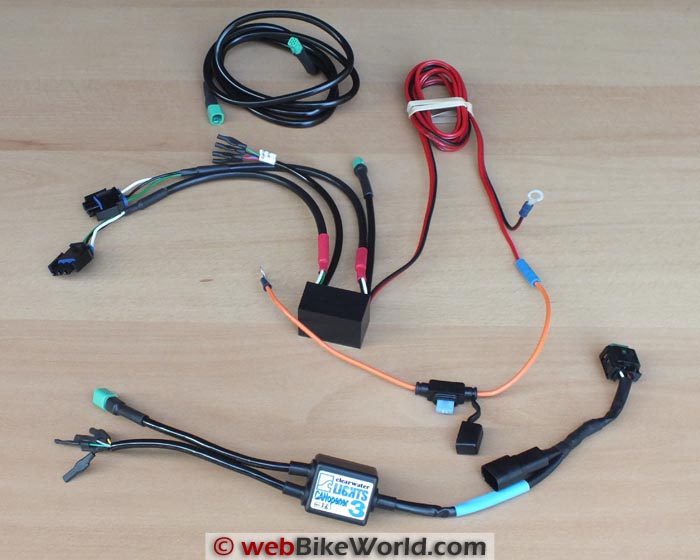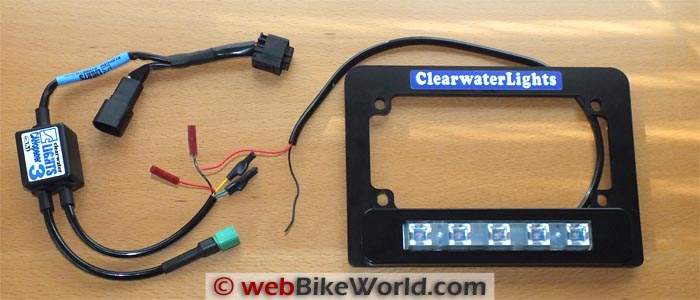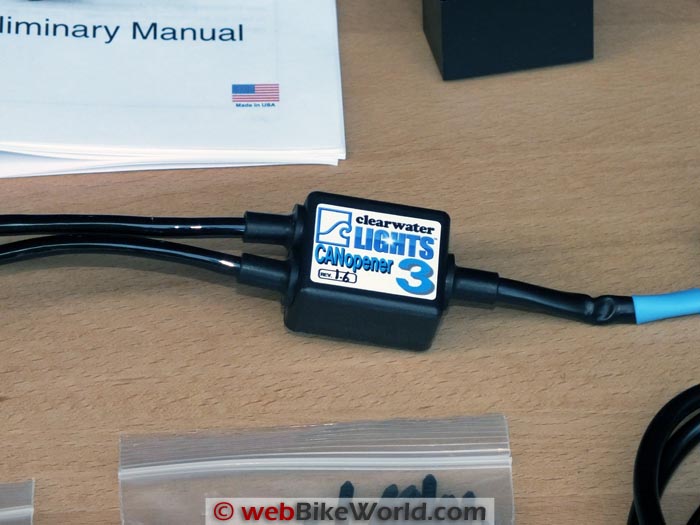Part 2: Working With the BMW CAN Bus Climb Aboard the CAN Bus
The BMW CAN bus is a complex albeit logical amalgamation of technologies.
It is based on a single-wire system and a bi-directional distribution network with multiple sensors and real-time processors for monitoring, diagnosis and control of virtually every component and capability on the motorcycle.
Interaction with the CAN bus system is accomplished with compatible electronics on BMW motorcycles, such as the Multi-Function Controller (MFC), the BMW Navigator V GPS and other devices.
The Multi-Function Controller also utilizes the “LIN“, an acronym for Local Interconnect Network, which is a universal serial communication system that works with the CAN bus.
The LIN provides simple serial communications between intelligent sensors and actuators for applications that don’t need the full bandwidth, flexibility or complexity of the CAN.
It is a simple solution for data exchange used, for example, by the rider’s interactions with the Multi-Function Controller to operate the Navigator V (if the navigation preparation mount option has been fitted to the motorcycle).
But despite all the positives that CAN bus brings, it is (or can be) less than friendly regarding accessory installation and in general, it doesn’t take kindly to being messed with, especially on newer models.
Tapping into a CAN bus equipped OE harness lead on older BMWs is often a 50/50 thing; sometimes you get away with it and sometimes you don’t.
A standard reaction in response to any additional electrical load sees the intrusion detected and the circuit or circuits shut down with normal functionality restored once the intrusion is removed.
With more recent BMW motorcycles, any ad-hoc intrusion into the bike’s wiring is likely to bring about a yellow warning on the dash with the circuit shutting down immediately or perhaps the entire system and recovery may or may not be simple.
But it isn’t all doom-and-gloom for accessorizing; it just needs to be done using recognized solutions.
And there are lots of solutions, ranging from direct battery connections to switched or distributed circuit devices or custom plug-and-play solutions with harnesses and micro-controllers, all providing a “hands-off” implementation so that integrity and function of the CAN bus system is (rightly so) not impaired.

Where to Buy Clearwater CANopener
Check Reviews & Prices on AmazonSee More: Motorcycle Accessories, Motorcycle Tire, Motorcycle Helmets
Opening The CAN
So now Clearwater Lights — after significant time and investment — tackles the BMW CAN bus with their new CANopener (get it?).
The Clearwater CANopener system does have its own compact wiring harness and custom modules, but the CANopener is completely unique because it has a “read-only” interface that monitors data signals on the CAN bus system without interfering with the BMW CAN bus system operation.
With the CANopener installed, the BMW Multi-Function Controller and other input controls on the left side hand grip of BMW motorcycles allow the rider to program, activate and control Clearwater lights in both the front and rear of the motorcycle, all without affecting the CAN bus system OEM codes in any way.
Think of it as a friendly and very helpful passenger along for the ride…

The Clearwater CANopener
The Clearwater CANopener is currently offered in two related flavours: the CANopener 3 for the liquid cooled BMW R1200GSW/GSAW and R1200RTW motorcycles and the CANopener 4 for the K1600 GT/GTL models. Although not yet confirmed, new 2015 “Water Boxers” should be suitable hosts as well.
Our “test mule” for this review is a 2014 R1200GSW, which was fitted with a big box of Clearwater products, all used for this detailed longer-term evaluation and review of the CANopener system, including:
- CANopener3 multi-section harness for the R1200GSW/RTW.
- A pair of Clearwater Erica LED lights (review) with brackets, hardware and lens covers.
- A pair of Clearwater Darla LED lights (review) with B58 fork mounts and hardware.
- A BMW Light (Bar (PN 77 51 8 529 215) with Clearwater add-on enhancements.
The CANopener Wiring Harness
The first section of the CANopener wiring harness includes the CANopener module with three sets of leads: one for the in-line connectivity to the CAN bus system via the tire pressure monitoring or TPMS system; the main data cable connection; and a five-wire auxiliary set for connecting the optional LED tail/brake-light module (prototype) and other future applications.
A long extension data cable (with or without the Trident adapter that supports other configurations) joins the main module and final relay section together.
Besides the data connection, the relay has power leads for the battery, leads for the Clearwater Darla/Glenda lights and a set of heavier leads for the Erica/Krista LED lights, depending on which are installed.
The Erica LEDs have been on my wish list as an upgrade to the well-used Cyclops Adventure Sports LEDs (review) that have adorned the GSW since shortly after it came home from the dealer. Justification? As stated in the original Erica light review, “…for many motorcycle owners, too much is never enough and if that’s you, well, then here’s your next set of lights!”
And if I can only have one set of auxiliary lights, then the Darla LEDs, along with the rotary dimmer control are my solution. At reduced power (5%) or a bit higher, they are excellent DRLs and nudging the rotary control open provides expedient augmentation lighting to widen and fill the way ahead. Flash-to-Pass or High-Beam activation brings the units up to full 2000 lumen output instantly.

Where to Buy Clearwater CANopener
Check Reviews & Prices on AmazonSee More: Motorcycle Accessories, Motorcycle Tire, Motorcycle Helmets
CANopener 101
The Clearwater CANopener plug-and-play solution allows the rider to program and manage the light output of one or two sets of Clearwater LED lights in the front and optionally the new rear-mounted Clearwater tail/brake light module, a prototype of which was provided for our review.
With the CANopener system installed, the rider has a diverse range of programmable and controllable lighting options available by using the BMW Multi-Function Controller (if installed) or alternatively by using the Clearwater handlebar-mounted digital encoder (rheostat) knob and the bike’s turn signal controls, flash-to-pass/high-beam button, horn and hazard light controls.
To repeat: the CANopener is a “read-only” device; it does not and can not interfere with any onboard system capabilities on a BMW motorcycle…but more on all of this later.
Configuring the CANopener to access to the BMW CAN bus is accomplished with a simple in-line harness that connects to the bike’s Tire Pressure Management System (TPMS). If the TPMS module isn’t an installed option, the necessary original equipment harness still can be used; it’s nestled along the right frame tubing under the easily-removed rear deck on the bike.
Design and build of the complete CANopener harness is typical Clearwater; that is, components scaled for easy installation, custom-length colour coded and labeled wiring (all excellent standards) to ease installation and support from some of the best written and illustrated instructions available.
Next: Part 3 CAN Opener Installation Notes
Where to Buy Clearwater CANopener
Check Reviews & Prices on AmazonSee More: Motorcycle Accessories, Motorcycle Tire, Motorcycle Helmets
Owner Comments and Feedback
See details on submitting comments.
NOTE: See Part 4 for the Owner Comments and Conclusion.



No Comment